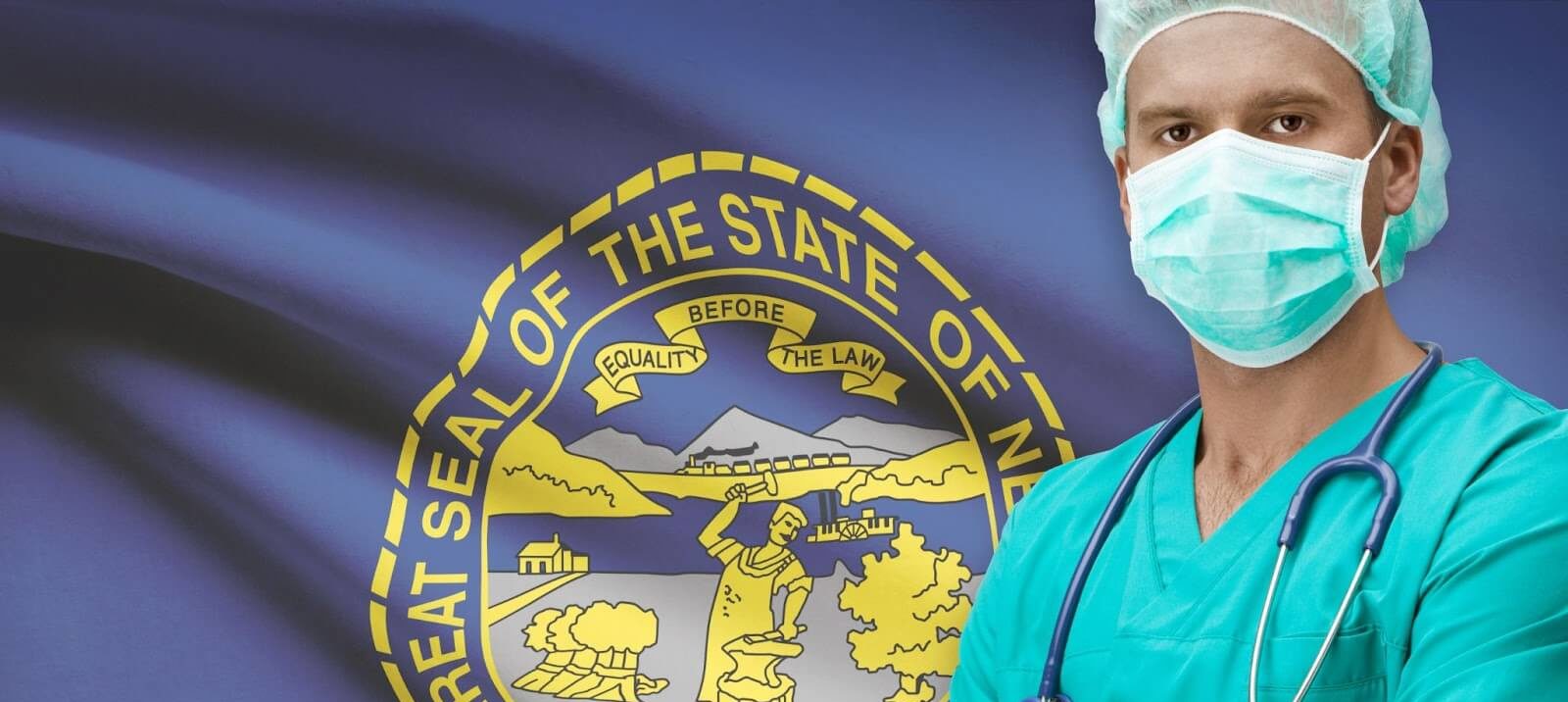The State of Nebraska is known for its endless sea of cornfields and breathtaking geological features. Many people don’t realize that Nebraska has more miles of river than any other state in the U.S.
Accordingly, it’s also home to more than 4,614 physicians across dozens of specialties.
Are you ready to apply for your medical license?
If you already meet the Nebraska Medical Board’s unique requirements, you could begin practicing within 12–16 weeks while spending less than $500 on the entire licensing process.
Now, here’s how to get a medical license in Nebraska:
Table of Contents
Nebraska’s Medical License Requirements
Moreover, the State of Nebraska licenses physicians through its Department of Health & Human Services (DHHS). During the licensing process, your interactions with the Nebraska Board of Medicine and Surgery will be through the Division of Public Health’s Licensing Unit.
Nebraska’s physician requirements revolve around two concepts — competency and patient safety.
So first, before you print out that application or send in a $350 check, verify that you meet the Board’s licensure requirements:
U.S. and Canada Requirements vs. Foreign Requirements
Moreover, if you attended medical school in either the United States or Canada, the basic licensing requirements include:
- Graduation from an accredited school
- One year of ACGME-accredited postgraduate medical education
- A passed licensing examination
For foreign medical graduates from any other country, the licensing requirements are a bit stricter, including:
- Two years of ACGME-accredited postgraduate medical education
- A passed licensing examination
- A “valid indefinitely” Educational Commission on Foreign Medical (ECFMG) certification — or a “Fifth Pathway”
Furthermore, meeting these requirements is step one.
We’ll talk more about supplying “proof” to the Medical Board later on.
Accepted Examinations
These licensing exams meet the state’s testing requirement:
- USMLE (United States Medical Licensing Examination)
- FLEX (Federation Licensing Examination)
- NBME (National Board of Medical Examiners)
- NBOME (National Board of Osteopathic Medical Examiners)
- COMLEX (Comprehensive Osteopathic Medical Licensing Examination)
- LMCC (Licentiate of the Medical Council of Canada)
- State board examinations
Therefore, keep in mind that there’s a four-attempt limit for each step, and you need to complete all steps within ten years. The minimum passing score is 75%.
If you don’t meet these three requirements, the Board will accept an extra year of postgraduate training instead.
Related: USMLE, CBSE NBME, MCCQE, + More: Medical Licensing Exams Explained
One Extra Requirement
Did you complete your residency, internship, or fellowship more than three years ago?
If so, you’ll have to meet one of these additional requirements:
- Complete 50+ hours of Category 1 AMA continuing medical education (CME).
- Practice medicine or surgery in another U.S. state, U.S. territory, or Canadian province for at least one year.
- Finish a Board-approved “refresher course.”
How to Fill Out the Application

After more than a decade of schooling and hands-on training, you’re ready for the easiest part of the license application process — the paperwork.
In the State of Nebraska, that’s a basic seven-page application (the application itself begins on page nine).
You have two choices here:
- Print the entire 17-page document and fill it out the old-fashioned way (with a pen) if you’re confident in your handwriting.
- Or, you can simply type in your information and print your ready-to-mail application.
Unfortunately, Nebraska doesn’t currently offer an online application portal or the FSMB’s Uniform Application like other states.
Let’s talk more about the application process.
What’s on the Application?
The Nebraska medical license application has ten brief sections, A through J.
Here’s a look at what’s in each:
- Information: Contact information, full name, aliases, date of birth, social security number, etc.
- Examination: Which exams you’ve taken; also, verify that you’ve requested those scores be sent to the Board
- Education: Includes high school and beyond
- Postgraduate medical education: Details about your previous internships, residencies, and fellowships
- Competency: Of the four options referenced earlier, you need at least one completed within the last three years
- Professional activities: A collection of your medical activities over the last ten years (must explain gaps of three months or longer)
- Controlled substances registration (if applicable): If you’re applying for a Federal Controlled Substances Registration for a field that prescribes controlled substances
- Conviction and licensure information: List any misdemeanor or felony convictions on your record; yes/no questions about possible disciplinary actions while licensed
- Practice prior to licensure: Whether you’ve ever practiced medicine in Nebraska pre-licensure — a “yes” answer could come with penalties
- Attestation: Verify your citizenship status and that your application is 100% accurate before attaching your signature
On the top-right corner of your application’s first page, ensure you tick the box for either “Medicine” or “Osteopathic.”
Where to Send Your Completed Application
Before you tuck your application into an envelope and seal it, triple-check that every field is complete and every question has a marked answer.
Furthermore, don’t forget to enclose a check or money order for $350 (made out to “Licensure Unit”) to cover the initial license fee and the Patient Safety Fee.
Then, mail your application and all supporting documents to:
Licensure Unit
PO Box 94986
Lincoln, Nebraska 68509-4986
Supporting Documents and Sending Proof
You’ll also need to support most claims you make in your written application on your road to a Nebraska medical license.
That typically means one of three things:
- Completing and submitting forms found at the end of the application (or on the Nebraska Department of Health and Human Services site)
- Contacting your medical school, postgraduate program director testing organization to submit supporting documents directly
- Sending copies of identifying documents to the Board yourself
Nebraska does partner with the Federation of State Medical Boards (FSMB) and accepts the Federation Credentials Verification Service (FCVS).
So if you plan to apply to several state boards or don’t want to send personal documents through the USPS, FCVS is a great alternative.
Now, here’s a closer look at what the Board’s requesting:
Proof of Lawful Residency
If you’re a lawful U.S. citizen, hitting this requirement won’t feel new to you (you probably do it every time you renew your driver’s license).
The Board needs a photocopy of one of the following:
- Birth certificate
- Passport (can be expired)
- Certification of Naturalization
Unfortunately, DHHS won’t accept a copy of your driver’s license as an alternative form of ID.
For Non-U.S. Citizens
If you aren’t a U.S. citizen, your proof of lawful residency will come from immigration paperwork, including:
- Permanent Resident Card (or a Green Card)
- Form I-94 plus a current foreign passport and U.S. visa
- Employment Authorization Card paired with an application for asylum, protected status, adjustment of status, or DACA approval
Keep in mind that it could take up to 30 days for the Department of Homeland Security to review and verify your documents.
Educational Transcripts
The Nebraska Board accepts both electronic and physical copies of your medical school transcript, as long as it comes directly from the institution.
In other words, you can’t send a copy yourself.
Your school’s sending options are mail (same address as listed above) or email at dhhs.medicaloffice@nebraska.gov.
Examination Scores
Submitting your licensing exam scores follows that same lead.
You’ll need to request an official score transcript from the FSMB, NBME, NBOME, or LMCC and select the Nebraska Board as the recipient.
If you aced a state board exam, reach out to that state’s board to request a score transfer.
Postgraduate Training
The second-to-last page on the application is a Certificate of Postgraduate Medical Education.
Don’t fill it out top-to-bottom yourself. All you have to do is print your name and social security number at the top. Then, send it to your postgraduate institution’s program director for them to complete it on your behalf.
An original signature and a notary seal are required.
For Foreign Graduates
In place of U.S. or Canadian medical school attendance, the DHHS requires the following documents from foreign applicants:
ECFMG Status Report
Did you graduate from a medical school outside of the U.S. or Canada?
If you answered yes, Nebraska requires an ECFMG certificate as an educational alternative.
Request a Status Report from the ECFMG either on their website or via phone at (215) 386-5900.
Verification of Foreign Medical College
Foreign applicants also need to complete and submit the form on the final page of the application — the Verification of Foreign Medical College.
Complete the first half yourself. Don’t forget to attach a photo of yourself so that your medical school can verify your identity.
Next, send it to your medical school, and ask the registrar or dean to complete the rest for you.
Again, this form has to come directly from your medical school.
Medical Malpractice Details
In Section H, Subsection V of the application, question #1 asks whether there’s ever been an adverse judgment or settlement against you.
A yes answer won’t automatically disqualify you from practicing in Nebraska.
However, the Board requires details about each claim, such as the initial diagnosis, damages, and the outcome.
If you answered yes to question #2 in that same section (about pending malpractice claims), you’ll need to supply similar information.
Criminal Background Check
Then, after submitting your application and paying the mandatory $45.25 fee to the Nebraska State Patrol, it’s time to undergo a new criminal background check.
For the record, old ones don’t count.
The fingerprinting process is simple for Nebraska residents:
- Visit a Nebraska State Patrol office to request fingerprint cards.
- Fill out the card, leaving the ORI and signature fields blank unless you’re told to fill them in. Be careful not to fold the form.
- Add “Controlled Substance” to the “Reason Fingerprinted” box.
- Get fingerprinted at the State Patrol office — either Live Scan or ink and paper — with a walk-in or pre-scheduled appointment (depends on location). Don’t forget to bring a photo I.D.
- Send your completed prints to:
Criminal Identification Division (CID)
3800 NW 12th ST STE A
Lincoln NE 68521
However, if you don’t live in Nebraska, you’ll need to contact your local law enforcement agency to undergo ink-and-paper fingerprinting (Live Scan not accepted).
Previous Convictions
Piggybacking off the same point, the Licensing Unit wants to know about your previous misdemeanor and felony convictions, not simple traffic tickets.
It’s a good idea to contact both the criminal and traffic courts if you’ve had previous run-ins with the law.
If there are convictions on your record, you’ll need to provide more information through:
- Court records
- An explanation (including how you’ve attempted to correct your actions and behaviors since the conviction)
- A letter from your probation officer
Are your past convictions alcohol or drug-related, like a DUI?
If they are, sending a copy of discharge papers from a treatment facility can help your case and improve your approval odds.
Active Federal DEA Certificate
The Board also asks for a copy of an Active Federal DEA certificate for healthcare professionals prescribing controlled substances.
How Long Does It Take to Get a Nebraska Medical License?

It typically takes anywhere between 12 and 16 weeks to get a Nebraska medical license, and the Board will process applications on a first-come-first-serve basis.
Afraid you forgot a supporting document?
Wondering if you left a field blank on the application?
If so, keep a close eye on your inbox.
Next, the Nebraska Board will send you an email within 15–20 days after receiving your application to alert you to any missing documents, forms, or proof.
Then, you have a 90-day window to finish the application.
Board Review Deadlines
Like almost every other medical board, Nebraska’s Board of Medicine and Surgery reserves the right to discuss your candidacy at an upcoming board meeting.
Moreover, the Board hosts 11 meetings a year (just about one each month).
In the month leading up to the meeting date, you’ll notice two deadlines:
- An application deadline that falls about a month in advance
- A document deadline about three weeks before the meeting
Make sure to submit your application and documents well in advance of the deadlines to fast-track the process if the Board requests a meeting.
Note: It could take ten weeks to process your criminal background check, so plan ahead.
How Much Does It Cost to Get a Nebraska Medical License?
Nonetheless, it usually costs $395.25 to get an initial Nebraska medical license (as of September 2020).
This cost includes:
- Initial licensure fee: $300
- Criminal background check: $45.25
- Patient safety fee: $50
However, this total doesn’t include the cost of stamps or shipping, transcript request fees, an FCVS (an additional $375) profile, or 50 hours of CME.
Fee Waivers
Under the Uniform Credentialing Act, you can also ask the State of Nebraska to waive 100% of your initial application fee if you’re:
- Aged 18–25
- A member of a military family (either active duty, a military spouse, or an honorably discharged veteran)
- Considered a low-income individual (qualifying for government assistance or falling below the federal poverty guideline)
However, you’re still responsible for the criminal background check and eventual license renewal fee.
Conclusion
Overall, Nebraska’s application process is more affordable and quicker than many other state medical boards.
Do you want to stay in the Midwest?
Still not settled on Nebraska?
The Interstate Medical Licensure Compact is the answer for nomad licensees hoping for a more exciting lifestyle.
In the last several years, 28 U.S. states banded together to expedite physician licensure across state lines while also cutting costs — including neighboring South Dakota, Iowa, Wyoming, Colorado, and Kansas.
Moreover, get your license in multiple nearby states to expand your practice even further.
Learn more about a Nebraska medical license on the DHHS website (dhhs.ne.gov), via mail at 301 Centennial Mall South, Lincoln, Nebraska 68509, or by phone at (402) 471-3121.
Subscribe to our email newsletter for expert tips about finances, insurance, employment contracts, and more!








































